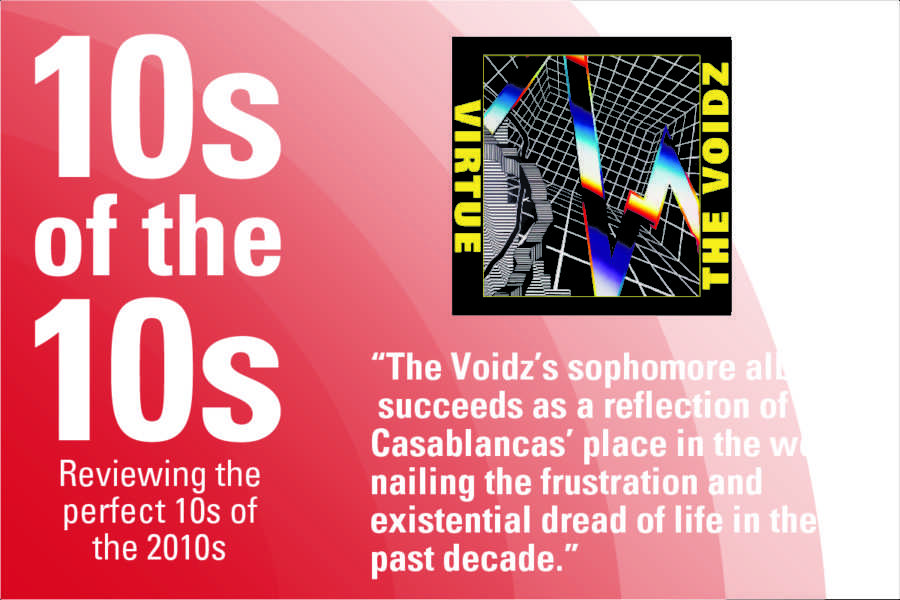10s of the 10s: The Voidz’s ‘Virtue’ reflects existential dread of the decade
10s of the 10s The Voidz
December 4, 2019
Learn from history or be doomed to repeat it. The Voidz’s sophomore album, “Virtue,” looks to the past, present and future — lyrically and musically — a product of the tumultuous past decade.
Julian Casablancas, frontman and visionary for the Voidz, warns of the dangers in repeating history, grappling with his past career and disillusionment with the powers that be.
“Virtue” bridges the gap between Strokes-defined alt-rock and “Tyranny,” the Voidz’s significantly more challenging debut. It also marks a rebranding for the group, cleansing the grimy, war-torn presentation for “Tyranny” in favor of retrowave 1980s-sheen, as well as Casablancas dropping his name from “Julian Casablancas+The Voidz.”
Casablancas began recording with the Voidz after feeling like he played it too safe with his debut solo album, “Phrazes for the Young,” he told Rolling Stone in an interview. Casablancas also talked about taking a break from collaborative friction he faces with the Strokes.
“[…] My personal vision quest from day one has not altered, and I think that I can’t tell other people what to do and I don’t want to tell other people what to do,” Casablancas said. “And I think that with the Voidz, I think we’re on the same wavelength. And with the Strokes it’s more like everyone does what they do.”
The Voidz don’t play it safe at all in “Virtue,” subjecting the listener to a calculated tonal whiplash of over 15 tracks on the nearly hour-long album. Their brand of experimental rock pulls musical influences from genres across the decades, with the band stretching and bending vocals and guitar far beyond their normal limits.
It’s clear Casablancas is doing exactly what he wants to with the Voidz by trying something bold and different every song.
Opener “Leave It in My Dreams” is a reflection on Casablancas’ career since the Strokes’ hit debut “Is This It,” in which he comes to peace with his regrets. The track lulls first-time listeners of “Virtue” into a false sense of security, echoing work from later in the Strokes’ discography, albeit with a nostalgic, lo-fi mask.
The Strokes’ familiar sound is found in other tracks like “Permanent High School” and “Lazy Boy,” both comparing juvenile fears and experiences to his career with the Strokes.
The former shows a high schooler finally learning about reality around him, experiencing “the horror of being awakened/And temporarily see the madness of your life.” The latter has Casablancas dealing with crushing feelings from disrupting the endless cycle of trying to please fans with his music.
His struggle with the constraints and expectations of being in such a renowned and influential band are apparent. Casablancas sees little reason to care in a world that expects so much of him and offers little in return.
The Voidz shatters the rose-tinted glass of “Leave It in My Dreams” in “QYURRYUS,” one of the catchiest tracks on the album, described by the band as “cyber-Arabic-prison-jazz.” Unstable synth wails are boosted by a wobbly Eurodance bass line, all backdrop to Casablancas’ Middle Eastern-inspired vocals — autotuned beyond distortion to become a human-powered synthesizer.
The track drops any pretense of “Virtue” simply by being another Strokes project. This is where the Voidz embark on their true “vision quest” as pieces to the great multi-genre mess of an album start to fall into place.
The band’s take on danceable pop music from the ’80s and ’90s, “All Wordz are Made Up,” recklessly bounces along, dripping neon into the track list’s palette.
“Wink” brings in breezy guitar licks and looped, booming industrial drums. Tongue-in-cheek lyrics show despite the regrets and uncertainty; Casablancas is ready to take on the future. “I don’t really know where I’m going,” Casablancas says on the track. “Not sure that I wanna be knowing/Everyone’s the hero in their made-up movie life.”
Casablancas lays out his political manifesto as the through line between “Phrazes for the Young,” “Tyranny” and “Virtue.” While the lyricism is blunt and often on the nose, it’s completely genuine coming from Casablancas after his infamous interview with Vulture, in which he decries U.S. democracy, capitalism and “cultural brainwashing.”
Casablancas goes after the rich, white elite in “Pyramid of Bones,” the closest “Virtue” gets to pure metal. He sees the “white devil” manipulating the masses and able to “play the game by different rules, insisting/It’s all equal.” Guitar winds like a steel cable, increasing tension in the song until it completely snaps into a cacophony of screaming and instrumental madness.
The album’s penultimate track “We’re Where We Were” is Casablancas’ breaking point, where he’s frustrated by his perceived unbreakable cycle of history. He sees the normalization and public apathy to atrocities akin to the rise of Nazi power. The track’s title indicates that we didn’t learn from the mistakes of the past, dooming us to the same fate.
“New holocaust happening/What are you blind/We’re in Germany now, 1939,” Casablancas opens with. “If you’re oblivious, you still have blood on your hands/’Cause you don’t think it’s wrong to kill an innocent man.”
In a time where the president — elected by nearly 63 million voters — initially defended Neo-Nazis at a white nationalist rally and condones the inhumane rounding up and caging of illegal immigrants, it’s hard not to see it his way.
The Voidz bring an unstable and aggressive energy to the track, carried by Alex Carapetis’ intense drumming, bombarding the listener with sonic missiles from the sky. The song crashes to a close as the world around crumbles.
“Pointlessness” reins in the chaos, bringing the album to a dark, miserable end with the drunken ramblings of a depressed man. Despite Casablancas’ pleas throughout “Virtue,” he knows the status quo will persist. As he moans “What does it matter?” he no longer clings on to the desperation for change, writing on not just feelings of angst but hopeless nihilism.
The Voidz’s sophomore album succeeds as a reflection of Casablancas’ place in the world, nailing the frustration and existential dread of life in the past decade. Between the album’s message — unlikely to soon fall out of relevance — and contributions to the evolution of rock music, “Virtue” is placed as one of the best albums of the 2010s.
About 10s of the 10s: Limelight is looking back at the best albums of the 2010s. While streaming services and viral singles have slowly withered the impact of a full length release, the best albums of the 2010s pushed boundaries, inspired new sounds and spanned a range of genres. Each album in the series is independently selected by the reviewer.







